
Magnetohydrodynamics
Scope & Guideline
Advancing Knowledge in Magnetohydrodynamic Applications
Introduction
Aims and Scopes
- Fundamental MHD Theory and Applications:
Research focusing on the basic principles of magnetohydrodynamics, including the governing equations, stability analyses, and fundamental phenomena related to MHD flows. - Numerical Simulation Techniques:
Development and application of numerical methods for simulating MHD systems, including advanced computational fluid dynamics (CFD) techniques to model complex interactions in conducting fluids. - Experimental Research in MHD:
Experimental investigations that validate theoretical models and numerical simulations, exploring practical applications of MHD in industrial processes such as metallurgy and energy generation. - MHD in Engineering Applications:
Exploration of MHD applications in engineering fields, including the design and optimization of MHD generators, pumps, and other devices that utilize magnetic fields to manipulate fluid flows. - Interactions of MHD with Other Physical Phenomena:
Studies that examine the interplay between MHD and other physical phenomena, such as thermal effects, compositional variations, and electromagnetic interactions in various systems.
Trending and Emerging
- Advancements in Liquid Metal MHD Applications:
Research on liquid metals in MHD applications, such as cooling systems, energy harvesting, and advanced manufacturing processes, is on the rise, highlighting the importance of liquid metals in modern technology. - Integration of MHD with Modern Computational Techniques:
There is a growing trend in utilizing advanced computational techniques, including machine learning and AI, to enhance MHD simulations, improving predictive capabilities and efficiency in modeling complex systems. - Electromagnetic Processing of Materials:
Increasing focus on the electromagnetic processing of materials, including refining, casting, and alloy production, indicates a shift towards practical applications that leverage MHD for enhanced material properties. - Multi-Physics Coupling in MHD Studies:
Research integrating magnetohydrodynamics with other fields, such as thermodynamics, fluid dynamics, and plasma physics, is emerging, reflecting a holistic approach to studying complex physical systems. - Sustainable Energy Solutions using MHD:
The exploration of MHD as a sustainable energy generation solution is gaining momentum, particularly in the context of renewable energy technologies and efficient power generation methods.
Declining or Waning
- Magnetohydrodynamic Effects in Environmental Studies:
Research exploring the effects of MHD in environmental contexts, such as atmospheric phenomena or oceanographic applications, has seen a reduction in the number of publications, indicating a shift towards more industrial and engineering-focused studies. - Theoretical Studies of Nonlinear MHD Dynamics:
While theoretical frameworks are foundational, there has been a noticeable decrease in purely theoretical studies of nonlinear dynamics in MHD, suggesting a preference for applied research and simulations that yield practical outcomes. - Basic MHD Phenomena without Practical Applications:
Papers focusing solely on basic MHD phenomena without immediate practical implications or applications appear to be declining, as the journal seems to favor research with clear industrial relevance.
Similar Journals
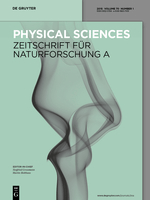
ZEITSCHRIFT FUR NATURFORSCHUNG SECTION A-A JOURNAL OF PHYSICAL SCIENCES
Unveiling the Mysteries of Matter and EnergyZEITSCHRIFT FUR NATURFORSCHUNG SECTION A - A JOURNAL OF PHYSICAL SCIENCES is a distinguished journal published by Walter de Gruyter GmbH, based in Germany, that serves as a vital platform for research in the realms of mathematical physics, physical and theoretical chemistry, and broader disciplines within physics and astronomy. Established in 1946, this journal has been a cornerstone for scientists and researchers, providing rigorous peer-reviewed articles that push the boundaries of knowledge in physical sciences. With a notable 2023 Scopus ranking reflecting its respected position in the field—Q3 in mathematical physics, physical and theoretical chemistry, and miscellaneous physics and astronomy—this journal not only emphasizes high-quality research but also enhances the visibility and impact of contributions within these areas. Although it does not currently offer open access, the insights shared in its pages are invaluable for advancing academic inquiry and sparking interdisciplinary collaborations. As it looks ahead to 2024, ZEITSCHRIFT FUR NATURFORSCHUNG SECTION A continues to invite contributions that align with its mission to foster an understanding of complex physical phenomena, making it an essential resource for academics, professionals, and students alike.
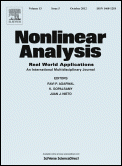
NONLINEAR ANALYSIS-REAL WORLD APPLICATIONS
Innovating Through Nonlinear InsightsNONLINEAR ANALYSIS-REAL WORLD APPLICATIONS, published by PERGAMON-ELSEVIER SCIENCE LTD, is a premier academic journal dedicated to advancing the field of nonlinear analysis through rigorous research and practical applications. With an impressive impact factor and categorized in the Q1 quartile across multiple disciplines including applied mathematics, computational mathematics, and engineering, this journal stands as a vital resource for researchers, professionals, and students. Its extensive scope encompasses significant contributions from the domains of economics, medicine, and various engineering fields, making it a leading platform for interdisciplinary exchange. The journal's commitment to showcasing innovative methodologies and solutions from 2000 to 2025 not only enhances its academic prestige but also fosters real-world impact, thus catering to a diverse scholarly audience eager to explore the complexities and potentials of nonlinear phenomena. Access options vary, ensuring a wide dissemination of knowledge to drive future discoveries in this dynamic area of study.

PRAMANA-JOURNAL OF PHYSICS
Advancing the Frontiers of Physics and AstronomyPRAMANA-JOURNAL OF PHYSICS, published by the esteemed Indian Academy of Sciences, serves as a pivotal platform for disseminating high-quality research in the field of Physics and Astronomy. Established in 1973, this journal aims to promote significant findings in various branches of physics, encapsulating both theoretical and experimental research. With a solid reputation reflected in its Q2 ranking in the Physics and Astronomy (miscellaneous) category and a commendable 94/243 rank in the Scopus database, PRAMANA stands at the forefront of the academic community. Researchers, professionals, and students benefit from its accessible compilation of innovative studies, contributing richly to the scholarly discourse. The journal, operating from its base in Bangalore, India, is committed to advancing knowledge through rigorous peer-reviewed articles, ensuring that all contributions hold merit in expanding our understanding of the physical world.
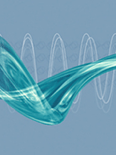
Annual Review of Fluid Mechanics
Empowering Researchers with Critical Fluid InsightsThe Annual Review of Fluid Mechanics, published by Annual Reviews, is a premier journal in the field of fluid mechanics, dedicated to advancing our understanding of fluid behavior through comprehensive and critical reviews of contemporary research. With an impressive impact factor that reflects its stature—ranking Q1 in Condensed Matter Physics and positioned 4th out of 434 in Scopus’s Physics and Astronomy category—it stands as a vital resource for researchers, professionals, and students alike. Since its inception in 1970, the journal has provided vital insights and synthesized knowledge that drive innovations and applications across various scientific disciplines. Although it does not offer open access, the journal ensures rigorous editorial standards and captivating content that contributes meaningfully to the academic discourse in fluid dynamics. Published annually, the Annual Review of Fluid Mechanics continues to be a cornerstone for anyone interested in the complexities of fluid movement and its implications in both theoretical and practical contexts.

Journal of Naval Architecture and Marine Engineering
Transforming Marine Engineering Through Open AccessJournal of Naval Architecture and Marine Engineering is a distinguished open-access journal dedicated to advancing the field of marine engineering and naval architecture. Published by the ASSOCIATION OF NAVAL ARCHITECTS & MARINE ENGINEERING in Bangladesh, this journal has been a crucial platform for the dissemination of innovative research and practical applications since its transition to open access in 2007. With an impressive Q2 ranking in Ocean Engineering and a well-respected position within the Scopus rankings, it serves a vital role in connecting researchers and industry professionals. Covering a wide scope of topics from hydrodynamics to ship design and marine environmental protection, the journal invites contributions that enhance the knowledge and technology within the maritime sector. Accessed by a global audience, it is an essential resource for those seeking to make significant advancements in naval engineering.

TECHNICAL PHYSICS
Advancing the Frontiers of Physics and AstronomyTECHNICAL PHYSICS, published by PLEIADES PUBLISHING INC, is a prestigious journal that has been serving the scientific community since its inception in 1996. With a focus on the diverse realms of physics and astronomy, this journal is committed to publishing pioneering research that spans various aspects of theoretical and applied physics. Though currently categorized in the Q3 quartile for the year 2023, TECHNICAL PHYSICS holds considerable merit with a Scopus ranking of #56 out of 81 in its field, positioning it within the 31st percentile. The journal aims to provide a platform for researchers, professionals, and students to disseminate their findings and foster collaboration within the global physics community. While it does not currently offer open access, the journal remains a vital resource for those seeking to stay informed of the latest advancements and trends in technical physics. Based in the heart of New York, it continues to contribute to the evolution of this dynamic field.

Journal of Nanofluids
Exploring the Future of Fluid Dynamics and NanotechnologyJournal of Nanofluids, published by AMER SCIENTIFIC PUBLISHERS, is a leading international journal dedicated to the burgeoning field of nanofluid technology which bridges the areas of fluid dynamics and nanotechnology. With an ISSN of 2169-432X and E-ISSN of 2169-4338, this journal has established itself as a valuable resource for researchers and professionals in Mechanical Engineering and Chemical Engineering, particularly in the domains of fluid flow and transfer processes. Its prestigious standing is reflected in the 2023 Scopus rankings, positioning it in the 79th percentile for Mechanical Engineering and the 78th percentile for Fluid Flow and Transfer Processes. Although coverage has been discontinued in Scopus since 2021, the journal maintains a Q2 category ranking in both relevant fields, emphasizing its commitment to high-quality and impactful research dissemination. This journal aims to foster innovation and collaboration among scientists and engineers worldwide, providing a platform for groundbreaking research, reviews, and discussions on nanofluids, their properties, and applications. As an essential addition to the library of any researcher or student vested in advanced fluid dynamics, the Journal of Nanofluids serves as a pivotal conduit for advancing knowledge and technology in this exciting and evolving field.
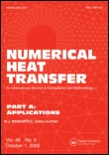
NUMERICAL HEAT TRANSFER PART A-APPLICATIONS
Driving excellence in numerical methodologies for heat transfer.NUMERICAL HEAT TRANSFER PART A-APPLICATIONS, published by TAYLOR & FRANCIS INC, serves as a premier outlet for cutting-edge research in the domains of numerical analysis and condensed matter physics. With an ISSN of 1040-7782 and an E-ISSN of 1521-0634, this esteemed journal has steadily maintained its influence in the academic community since its establishment in 1989, continuing its publication into 2024. Currently ranked in the Q2 quartile for both Condensed Matter Physics and Numerical Analysis, it stands as a vital resource for researchers committed to advancing computational methodologies and applications. The journal's Scopus rankings reflect its growing impact, particularly in mathematics, where it is placed in the top 26% of its category. Although not an open-access journal, its comprehensive research articles and detailed applications foster innovation and collaboration, making it essential for professionals and students aiming to deepen their understanding of thermal transfer phenomena through numerical techniques. This journal not only bridges theory and application but also propels forward the field of heat transfer.
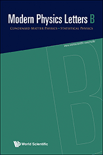
MODERN PHYSICS LETTERS B
Pioneering insights in the realms of condensed matter and statistical physics.MODERN PHYSICS LETTERS B, published by World Scientific Publishing Co Pte Ltd, is a pivotal journal in the fields of Condensed Matter Physics and Statistical and Nonlinear Physics. With an ISSN of 0217-9849 and an E-ISSN of 1793-6640, this journal has been a prominent platform for innovative physics research since its inception in 1996, catering to a global audience of researchers, professionals, and students alike. Its impact is reflected in its Scopus rankings, with a commendable position in the 65th percentile for Statistical and Nonlinear Physics and the 54th percentile for Condensed Matter Physics. Despite its classification in the Q3 quartile, MODERN PHYSICS LETTERS B is dedicated to advancing knowledge through rapid dissemination of high-quality research, thus playing a critical role in shaping future developments in its disciplines. Published in Singapore, the journal encourages contributions that address contemporary challenges and breakthroughs in physics, fostering an engaged scholarly community.
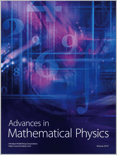
Advances in Mathematical Physics
Exploring the Boundaries of Mathematics and PhysicsAdvances in Mathematical Physics is a premier open-access journal published by HINDAWI LTD, dedicated to the dissemination of research in the fields of applied mathematics and physics. With its ISSN 1687-9120 and E-ISSN 1687-9139, this journal has been a vital platform for innovative studies since its inception in 2009, fostering a collaborative environment for researchers and professionals alike. The journal features a wide range of topics, including but not limited to mathematical models, computational physics, and interdisciplinary applications, thus attracting a diverse readership. Ranked in the Q3 quartile for both Applied Mathematics and Physics and Astronomy, it serves as a significant resource for academics looking to explore cutting-edge developments and theoretical advancements. With an emphasis on open accessibility, Advances in Mathematical Physics ensures that research findings are readily available to the global academic community, leveling the playing field for emerging scholars and seasoned researchers. By consistently showcasing high-quality manuscripts, the journal contributes substantially to the fields of mathematics and physics, encouraging scholarly dialogue and advancing knowledge across a myriad of applications.